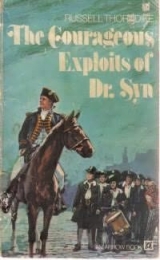
Текст книги "The COURAGEOUS EXPLOITS OF DOCTOR SYN "
Автор книги: Russell Thorndike
Жанр:
Исторические приключения
сообщить о нарушении
Текущая страница: 16 (всего у книги 16 страниц)
15
THE REMOVAL OF CAPTAIN BLAIN
One morning, during the smoking of his first pipe, Mipps received a visit from the onion-boy from France, who
promptly unhooked one of the strings and laid it down on the lid of the coffin, pinching one of the bulbs as though to
exploit his fine wares. Mipps opened the top skin of this onion and drew out a small roll of parchment. This he read
through, and then unlocking a Bible box that served as a desk he drew out one of his ledgers. He turned up a list of
names and numbers attached to them, and compared it with the parchment. The names were those of luggers
harboured in the Scarecrow’s base in France.
Having checked over the numbers, against the names, he took a quill and wrote at the foot of the list the twenty-third of this month. He then drew a few simple lines which gave the crude shape of a scarecrow, after which he
replaced the list inside the onion, give it back to the boy, and bought another of the strings which he slung up to a
hook in the beam.
The onion-boy was paid, and at once set off to the sea-wall where he took the direction to Rye.
An hour later Doctor Syn sat opposite Captain Blain at breakfast in the Vicarage.
“Do you know, Doctor,” remarked the Captain casually, “that I have been on your hands for an unconscionable
time, but you will be no doubt relieved to hear that my duties here are rapidly drawing to a close.”
“So you are going to give up the idea of catching this elusive Scarecrow at last,” said the Doctor.
“Rather better than that, Doctor,” replied the Captain, with a smile. “In ten days I shall be handing him over to
the gallows.”
“Are you serious?” asked the Doctor.
The Captain nodded. “In ten days there is to be a great ‘run’. You can look surprised, but I regret I cannot tell
you how I know. But know I do. Ten days’ time makes it the twenty-third, and it is an important date to me. It
marks my fiftieth birthday, and what is more, my fiftieth year at sea, for previous to becoming a Royal Navy boy I
was afloat at home, having been born on H.M.S. Crocodile, the Guard Ship of the Tower of London, of which my
father was in command. I suppose, Parson, that I have done a good deal of good duty since those days, but
somehow have not been in great favour at the Admiralty, for they have not yet given me an admiral’s hat. So I take
it as something ironical that on the day of this celebration I shall be able to do a job ashore that will give me a very
wide notoriety. The arrest of the most impertinent scoundrel of our days is bound to create a big stir.”
“You certainly whet my curiosity, Captain,” interrupted the Vicar, “I hope you will tell me more.”
The Captain shook his head. “No one knows just how much I know about this Scarecrow. I have kept my own
counsel through all these months, during which I have had nothing but sneering and criticism. I have purposely not
reported the great progress I have made to the authorities. I have let them rave at me to their hearts’ content, and all
the time I have been planning and plotting, working in the dark, alone, until I saw the first tiny thread of light, which
I turned rapidly into a beam, and now has broadened into the full daylight. I should like to tell you of all men the
whole remarkable story of how my deductions grew, forging themselves one by one into a chain for the Scarecrow
on Execution Dock.
“But it is not my way to talk. I never believed in it as a policy. Not even my Bos’n realizes that I am going to
put my hands on the Scarecrow upon the night of the twenty-third, or how I am going to do it. I shall give orders
when the time comes, and then he and the men will be surprised at our success. I knew I could get him sooner or
later, and so I could afford to ignore the scoffers. But what a hanging it will be, Doctor.”
The Vicar repeated the word ‘Hanging’, and then added, “Have you remembered that the Prince of Wales has
declared himself the rascal’s protector from that fate?”
“Parson, Parson,” laughed the Captain. “You forget that you used up that way of escape for your rascally
parishioner when you saved that Old Katie from the gallows. I don’t suppose even you would have the temerity to
go to the Prince again with that request.”
“I have quite a natural abhorrence for the gallows,” returned the Doctor, “and would do anything to save even
this Scarecrow from such a barbarous end.”
It was after this conversation that Doctor Syn made a discovery which annoyed him. As he went about his lawful
calling as spiritual head of the Marsh he found that two of the Captain’s best men had been detailed to dog his steps.
He demanded an explanation.
“I suppose I owe you that at least, Parson,” said the Captain. “I have every reason to believe that the Scarecrow
knows that his number is up on the night of the twenty-third. What would I do in his place? Give up the planned
landing? Perhaps, but that is not his way. He is too arrogant to give up anything o f his own planning. But knowing
that it was you, Doctor Syn, who used influence with the Prince to save Katie, he will try to get into communication
with you. He knows he can trust you as a person. He has the right to come to you for advice. Not that he would
take it, but he might possibly be able to persuade you, with you natural abhorrence to hanging, to go once more to
the Prince. Therefore since he may come to you I intend to know everyone who gets into contact with you, for your
own protection, as well as for my own satisfaction.”
The days that followed were anxious ones for the Vicar and his Sexton.
“How much did the Captain know? Was his confidence in his success merely a bluff?”
Doctor Syn thought not.
That he had something to go upon was obvious, as one of his first steps was to set a guard not only outside the
Vicarage, but also within sight of Mother Handaway’s upon the Marsh.
However, a watch upon the secret stable had been anticipated by Doctor Syn. Jimmie Bone was there to look
after the horses, and there had been stored enough provisions for man and animals to cope with such an emergency.
Jimmie Bone could withstand a siege, but Mipps had a further comfort.
“There’s this to it, sir,” he said to the Vicar, as he helped him on with his Geneva gown before taking Evensong,
“when we has to get into the stables and can’t wait no more it will only mean that them good little sailors will have
to get a crack on their heads.”
“And a clumsy way it would be,” replied the Vicar. “I imagine I shall be able to show the Captain a better trick
than that.”
The days followed without incident. Doctor Syn went about his parochial business escorted at a respectful
distance by the sailors, and the Captain went about his, silently but with a growing attitude of confidence.
To avoid Mother Handaway’s would have been to create suspicion. Doctor Syn rode over there as usual and the
sailors had to wait outside and listen to his deep voice reading the old woman many a passage from the Scriptures.
Several times Mipps urged the Vicar to abandon the landing on the twenty0third, but Syn replied that if they were
to be hindered by every danger that presented itself, they might just as well quit the business altogether.
A few days before the dreaded date, when Mipps nerves were stretched to the breaking-point, the Vicar patted
him kindly on the shoulder, and told him that there was no cause to worry since he had solved the difficulty in his
own mind.
To the Captain he said later: “I shall be giving your sailors a rest for three days, as far as watching me concerns
them, for I am due to attend an important ecclesiastical meeting in the Lower House of Convocation, which means I
must be in Westminster. The good Squire has placed his coach at my disposal, and he prefers his own armed
servants to guard his vehicle from the dangers of the road, to sailors. The coach will not be able to accommodate
my watchers, excellent fellows as they are.”
“I have no jurisdiction to place my men on the Squire’s coach, and unless I choose to ride behind you to London
independently you will not be watched.”
Doctor Syn could see that his departure for London annoyed the Captain for all that.
“I can promise you one thing,” remarked the Vicar when he was ready to set off, “and that is I shall be back in
my parish for the twenty-third. As a matter of fact I shall be with you the day before.” He then added: “If you are
contemplating a pitched battle against the Scarecrow’s gang that night, there will be heavy casualties no doubt, and
my ministrations to the suffering will be needed. I shall be ready to attend the sick and dying, whether amongst your
men or the Scarecrow’s.”
Doctor Syn did not enter the Lower House at Westminster. He went instead to Carlton House, on a personal visit
to the Prince of Wales.
Although the anteroom was thronged with notabilities, amongst whom were two bishops, he had the extreme
satisfaction of being summoned to the Prince’s presence before all others. The last to arrive, he was the first to be
admitted.
The bishops, to be sure, put their bewigged heads together wondering why an obscure rural dean should be
preferred before lawn sleeves. Neither could they understand why the Prince should be so far interested in one of
their own cloth, since it was usually his way to admit first of all those rich enough to pay up some of his debts.
However, when, after some half-hour the striking-looking parson was brought to the Presence Chamber door by the
Prince himself, they felt it incumbent upon them to pay court to him before he left the anteroom, and they eyed with
a good deal of curiosity the sealed letter which the parson held, addressed to Admiral Troubridge, Admiralty House,
Whitehall, in the Prince’s own handwriting.
But Doctor Syn, though exceedingly polite and respectful to his superiors, was as tight as an oyster for
communication as Captain Blain.
To be quite candid neither of the bishops had ever known the Prince to be so condescending to a member of the
cloth, and his last words had puzzled them. Why had the Prince of Wales said to a country parson: “I have told the
old boy to do exactly as you ask. A promise is a promise, Doctor, though I think you have been guilty of cheating.
You’ve kept me very strictly to the letter of it rather than to the motive which made me make it. You ask a favour
for this fellow, and I don’t really like what I’ve seen of him. Never mind. Have it your own way, and if you want to
repeat the request at any time for yourself, it still holds good. And at a word, if things don’t fall out as you planned
‘em, tell me and there’ll be the devil to pay for the old boy. If you come up to London for a sermon let me know. If
you come up for any reason, apart from preaching, still do so, and you can regale me with some more of those tales
about the heathen you have met. God bless you, Parson, and think well what I’ve told you about lawn sleeves.
There’ll be money enough to pay for their laundry, I promise you.”
The bishops had not missed a word. They went home and repeated it to their wives. Who was this parson who
asked favours for another fellow from the Prince? Who was the fellow for whom he begged? Was it his curate?
And why the letter to the Admiralty? All very puzzling, especially as the Prince had not appeared to them that day
in at all a communicative mood. He had certainly taken no interest in the laundering of their lawn sleeves.
From Carlton House Doctor Syn strolled along to Whitehall and entered the Admiralty. He had to wait a good
deal longer for Admiral Troubridge than he had had to do for the Prince. But he had far more confidence in being
able to get what he wanted from the Admiral than he had ever entertained with reference to the Prince, although as it
had turned out, nothing could have been easier. He had cleverly handled the very difficult First Gentlemen of
Europe and had really made him behave like a gentleman, which not everyone was able to do.
What was more to the point he had not come away as so many had to do with an empty promise. There was no
reason for him to quote that passage of scripture which says, ‘Put not your trust in princes, nor in any child of man,
for there is no help in them. He had come out of the Presence Chamber at Carlton House with a letter, the contents
of which he had himself directed the Prince to write. It was couched in terms that could not be ignored by the
Admiral.
Moreover, the old sea-dog was well acquainted with the Prince, and was very proud of the fact, and the tone of
the Prince’s correspondence being friendly and confidential, pleased him so vastly that he would have been willing
to undertake a harder commission for His Royal Highness than was requested.
Doctor Syn owned that he knew the contents of the letter, saying that the Prince had insisted upon reading it to
him, while he kept so many notabilities waiting for audiences.
He then tactfully recounted all the good things which the Prince had said of the Admiral, such extravagant praise
that had never entered the Prince’s head, much less issued from his mouth. Doctor Syn was perfectly aware that
these exaggerations could never be repeated by the Admiral.
But though delighted to hear how very high he was in favour with the Prince himself, he was mystified at the
Royal attitude towards such an officer as Captain Blain.
“It is quite conceivable that His Royal Highness might have recommended the fellow for promotion,” he
remarked to Doctor Syn, “but all these minute orders as to how it must be carried out seem very extraordinary under
the circumstances. Besides although you say you have taken quite a liking for Blain, I assure you he is by no means
looked upon as a likeable fellow in the Service.”
“But surely, my dear Admiral,” suggested Doctor Syn, “His Royal Highness has ever had the reputation for
taking the queerest fancies for people.”
“Well, he’s carrying it very far in this case,” went on the admiral. “He is treating Blain much as we treat a
favourite child at Christmas. You know, ‘Must make it a happy day for the nipper’ sort of thing. I wonder he had
not ordered the Admiralty to send him a cake with fifty candles round it. Of course, I must conform to the Prince’s
wishes as far as I am able, but the Prince should know more about the Service than to write a ridiculous sentence
like make him an Admiral or something and oblige. I can’t go making people Admirals at a moment’s notice.
We’ve too many as it is.”
“He does say, ‘An Admiral or something’,” said the Doctor. “Perhaps there’s something that he could be made.”
“I know the very thing,” the Admiral suddenly exclaimed. “I could get him the Crocodile. She had only a
temporary officer in command, and the Guard Ship to the Tower of London is a step higher than a Guard Ship at
Dover. I think that solves it. We’ll send Blain on his fiftieth birthday, back to his nursery. His father had it and
became an Admiral. It’s a stepping-stone, and if I pop him on board the Prince will at least see that I am exerting
myself for his protégé.”
“He is certainly wasting his time, and that of his men, on Romney Marsh,” said the doctor. “If I may say it, with
all deference, you yourself were unable to string up our atrocious Scarecrow. No doubt you would have got him had
you stayed at Dover, but Blain is hardly the man to succeed where even you failed, though he has been about the
business for a considerable time, and unlike you, has been billeted on the spot.”
“Aye, and as I have pointed out to him,” put in the Admiral, “the landings have gone on all the time, and on a
vaster scale that in my time. No one will catch the Scarecrow, Doctor Syn. I am sorry to say so, since I know how
vigorously you have worked to get your territory clear of his tyranny. But I would rather be ordered to go down to
hell and arrest the Devil himself than he expected again to catch that rascal. He’s uncanny, and that’s about the size
of it.”
“I begin to think so myself, sir,” replied Doctor Syn.
With a great deal of importance the Admiral once more read aloud the Prince’s letter, and then began to write out
a memorandum on the details to be carried out.
“If I remember right Blain rides every tolerable, doesn’t he?” he asked, looking up from his writing.
“An excellent horseman,” replied the doctor. “It is an accomplishment that I envy. My little pony is about all I
can manage.”
“Well, I am not much of a hand at it myself,” returned the Admiral. “Though I tell my brother, the General, that I
cut a finer figure than he does in the saddle, for all his dragooning, especially when the animal is come to anchor.
Every man to his calling. The horse to the soldier; the dock to the sailor, eh?”
“And the pulpit to the parson,” laughed Doctor Syn.
The Admiral returned to his notes. “So Blain rides. That means another horse. One for the Admiralty courier,
and the other for him. He has a horse at Dymchurch, I see, from his reports, borrowed from the garrison on Dover,
but that one must be returned. Better not trust it to the Bos’n neither. They must detail some officer who can ride to
fetch it, from Dover. He can escort the men back at the same time. I’ll not have them wasting any more time
helping the Revenue men not to catch the Scarecrow. If they want to do it, they should do it properly and
commission the Channel Fleet to sink his luggers.”
“So my Tythe Barn will be able to return to its agricultural uses undisturbed at last, eh?” laughed the Doctor.
“Aye, Doctor, and you’ll get no more Admiralty rentage for you Sick and Needy Fund from that source. Now
wait a minute,” went on the Admiral. “I must not forget the common dangers of the road. Not that I think your
Gentleman James would hold up and Admiralty courier without getting as good as he gave, but”
“Oh, our Jimmie Bone has gone into hiding, they say, sir,” explained the Parson. “I think you can rule him out of
this.”
“But accidents will happen even to couriers,” went on the Admiral. “So to prevent them I’ll dispatch my best
courier the day before, that is on the twenty-second, to Dover. He can carry dispatches to my successor there and
save a journey. He can accompany the officer who is to fetch the horse and men, so that all can be clear at
Dymchurch when Blain leaves it on the twenty-third. I think, doctor, that settles everything which will ensure
Captain Blain having a pleasant birthday and a surprise present when he arrives hot and dusty for orders here. I
shall then hand him his credentials for the command of the Crocodile . And I hope for his own sake that he’ll make a
better job of it than he has over this Scarecrow business, which the Navy had far better have left alone.”
When the Squire’s coach rolled up before the Court House door in the evening of the twenty-second, Captain
Blain was pacing the front garden of the Vicarage, as though he were on his quarterdeck. The Squire, who had just
returned from a run with the hounds, was chatting with Major Faunce who had accompanied him. Both men were in
the saddle as Doctor Syn, neat and trim despite his long journey, stepped out of the vehicle.
“Welcome back from London, my good Christopher,” cried the Squire. “And I hope my cattle behaved well?”
“A most comfortable journey, Squire,” returned the Doctor. “And your good fellows did not have to use pistols
or blunderbuss upon the road. I had the happiest time meeting many of my good colleagues. I also had the extreme
honour of being entertained most graciously by the Heir Apparent, who received me before a brace of bishops, who
were told to wait. So you see our Romney Marsh is of some importance in the Capital.”
He spoke loud enough for the Captain to overhear, who out of politeness was forced to come forward to greet his
host, though it was obvious he would have liked to have avoided meeting the Major of Dragoons. Doctor Syn noted
this out of the tail of his eye. Neither has he missed the look of extreme surprise, and something of relief, when he
had seen him step out of the coach.
The Squire invited them into the Court House, and they accepted his hospitality to the extent of a glass of wine,
but declined to stay to supper. Doctor Syn pleading fatigue from his journey and the Captain saying that he had
planned a long day with his men on the morrow and wished to turn in as early as possible.
So host and guest returned after a while together to the Vicarage, where over an early supper the Captain
remarked that he had not expected to see doctor Syn so soon.
“I told you that I should be back for the twenty-third,” replied the Vicar.
“I thought you might wish to avoid the arrest of the Scarecrow,” said the Captain, “since you expressed such an
aversion to the gallows.”
“I did not allow myself to think of things unpleasant,” replied the Doctor. “But I did not forget that tomorrow is
your fiftieth birthday. And do you know, I thought I ought to be here to see that my housekeeper puts the usual
candles round a cake.”
The Captain laughed at that, and as soon as politeness would allow, excused himself for bed.
Doctor Syn said that he would not be long behind him in seeking his own four posts, though he had to hear the
parochial news first from his henchman, Mipps.
In the locked study by the candlelight, Mipps had to cram a corner of his handkerchief into his mouth to prevent
his laughter becoming audible to the sleeping Captain. He owned, after many a good drop of brandy that had never
paid its dues, that his master had surpassed himself, and only hoped that all would work out to the clock-work
pattern set by him.
The next morning his doubts were dispersed, because the clock-work worked.
The Doctor was awakened by a violent hammering upon the front door. At least the Captain thought it had
awakened him as it had himself. In reality the Vicar had not been without anxiety, and was lying awake to hear it.
But he let the Captain rise first, and when he appeared in a flowered dressing gown and night-cap, he looked
down from the head of the stairs and saw his guest talking to a mud-bespattered courier. The front door was open,
and there he saw a mounted naval officer holding the courier’s horse. The Captain was holding an official
document, and reading it by the lig ht of dawn which illumined the hall window by the door.
“So as far as I’m concerned,” the Captain was saying, “it means boot and saddle for Whitehall, and at once, eh?
And the officer outside is to take my men back to Dover. Well, orders are orders. I hope it means that they are
sending me to fight the enemy on the high seas.”
“What is all the trouble?” asked the Doctor innocently. The matter was explained rapidly by the Captain. Doctor
Syn roused his housekeeper and ordered breakfast to be prepared while the Captain got into uniform.
At breakfast he not only wished his departing guest a very many happy returns of the day, but hoped that this
change of front from the Whitehall spelt good fortune for him.
“It speaks of promotion,” said the Captain during breakfast, as an explanation to his host. A coincidence that
such an unlooked-for event should have occurred on my birthday, when I might well have expected to be shelved. I
could have wished perhaps for one more day, which the courier tells me is impossible as the matter is of the greatest
urgency. But I would sooner gain my laurels from my naval work that gain notoriety through the capture of a
criminal. But it’s a lucky happening for the Scarecrow. Any by the way, Vicar, it is also something of a
coincidence that this should follow upon the heels of your visit to the Prince. I more than half suspect that I have
you to thank for it, eh?”
“As to any conversations I had with His Royal Highness,” returned the Vicar, “I can assure you of one thing. I
took your advice and did not ask the Prince a second time to save the Scarecrow’s life. On the other hand, though
what I said to him and he to me I must think of as confidential, concerning his high rank. I will tell you that he
seemed especially interested in your career. I told him that you had been born on H.M.S. Crocodile , and that today
made your fifty years upon the waters complete. He really seemed most interested. But it does seem a pity that
your work here should be so quickly terminated when you had apparently nearly completed it with the success for
which you had worked.”
“Aye, Parson,” replied the Captain grimly. “I swear to you that I should have had him tonight. But will I pass on
my information to that insufferable Dragoon? A thousand times, no. I would prefer to drink the good health of the
Scarecrow, like the Prince commanded up at Lymphe. And what is more, that I shall do tonight as soon as I have
left the purlieus of Whitehall. Good luck to him now. And good luck to you, too, Parson. Both clever fellows, on
my soul. Perhaps one day we shall dine together, and perhaps then I might feel inclined to tell you all I have found
out about your rascally parishioner. On the other hand, promotion may increase that habit I have ever had of
knowing when to keep my ugly mouth shut tight.”
So the Captain galloped off with the Whitehall courier, and soon after the sailors marched off behind the
mounted officer to the tune of the drum and fife.
And to the tune of another song the Vicar of Dymchurch lifted a glass of brandy and toasted his Sexton across the
study table. “The most dangerous situation of our long careers, eh, Master Carpenter?” he whispered. “And got
over in such a simple fashion. We can now relieve poor Jimmie Bone and tell him that the run goes forward this
night. And so I drink to you, old faithful sea-dog, in the well-remembered words of Clegg:
‘ Here’s to the feet wot have walked the plank;
Yo-ho for the dead man’s throttle:’”
Which in a piping whisper, was responded to by Mipps with:
“ ‘ Here’s to the corpses afloat in the tank:
And the dead man’s teeth in the bottle’.”








